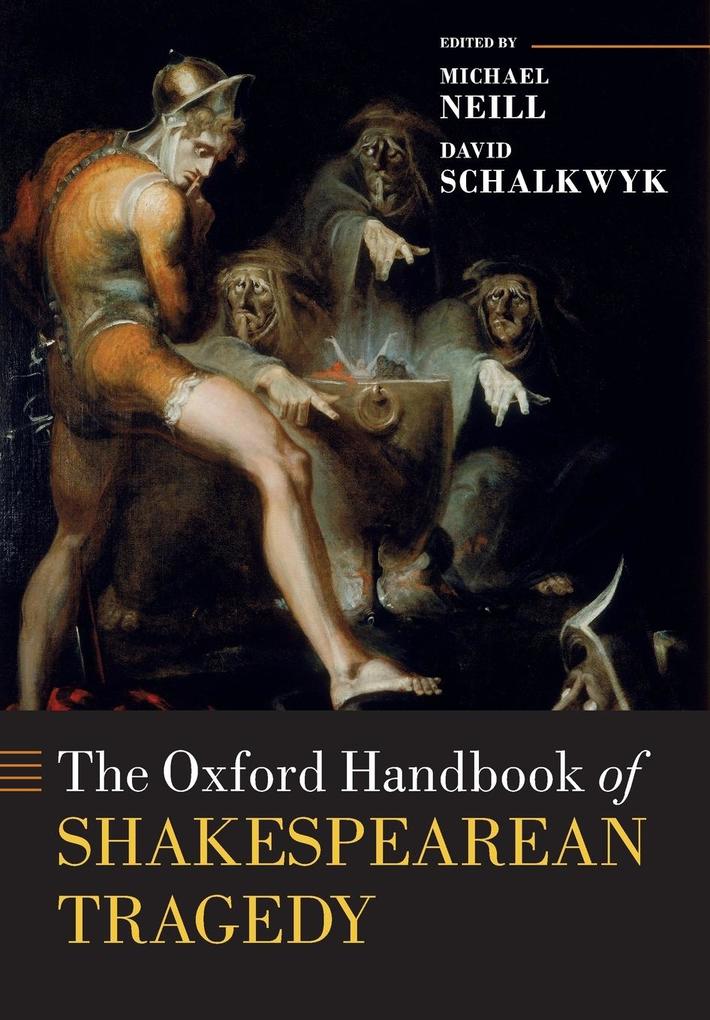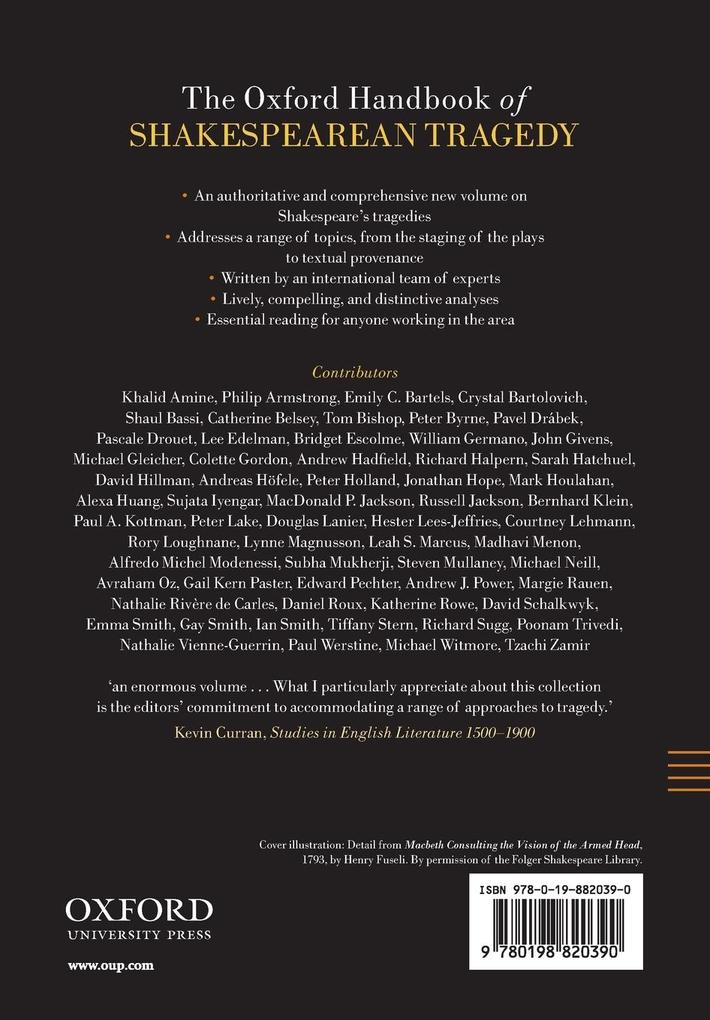
Zustellung: Do, 12.06. - Sa, 14.06.
Sofort lieferbar
VersandkostenfreiBestellen & in Filiale abholen:
The Oxford Handbook of Shakespearean Tragedy brings together fifty-four essays by scholars from all parts of the world. It offers a fresh and comprehensive understanding of Shakespeare tragedies as both works of literature and as performance texts, written by a playwright who was himself an experienced actor.
The Oxford Handbook of Shakespearean Tragedy presents fifty-four essays by a range of scholars from all parts of the world. Together these essays offer readers a fresh and comprehensive understanding of Shakespeare tragedies as both works of literature and as performance texts written by a playwright who was himself an experienced actor. The opening section explores ways in which later generations of critics have shaped our idea of 'Shakespearean' tragedy, and addresses questions of genre by examining the playwright's inheritance from the classical and medieval past. The second section is devoted to current textual issues, while the third offers new critical readings of each of the tragedies. This is set beside a group of essays that deal with performance history, with screen productions, and with versions devised for the operatic stage, as well as with twentieth and twenty-first century re-workings of Shakespearean tragedy. The book's final section expands readers' awareness of Shakespeare's global reach, tracing histories of criticism and performance across Europe, the Americas, Australasia, the Middle East, Africa, India, and East Asia.
Inhaltsverzeichnis
- Part I: Genre
- 1: Paul A. Kottman: What is Shakespearean Tragedy?
- 2: Richard Halpern: The Classical Inheritance
- 3: Rory Loughnane: The Medieval Inheritance
- 4: Edward Pechter: The Romantic Inheritance
- 5: Tzachi Zamir: Ethics and Shakespearean Tragedy
- 6: Emma Smith: Character in Shakespearean Tragedy
- 7: Philip Armstrong: Preposterous Nature in Shakespeare's Tragedies
- 8: Lynne Magnusson: Shakespearean Tragedy and the Language of Lament
- 9: David Hillman: The Pity of It: Shakespearean Tragedy and Affect
- 10: Steven Mullaney: 'Do You See This?' The Politics of Attention in Shakespearean Tragedy
- 11: Peter Lake: Tragedy and Religion: Religion and Revenge in Titus Andronicus and Hamlet
- 12: Richard Sugg: Shakespeare's Anatomies of Death
- 13: Gail Kern Paster: 'Minded Like the Weather': The Tragic Body and its Passions
- 14: Andrew Hadfield: Shakespeare's Tragedy and English History
- 15: Tom Bishop: Shakespeare's Tragedy and Roman History
- 16: Hester Lees-Jeffries: Tragedy and the Satiric Voice
- 17: Subha Mukherji: 'The action of my life': Tragedy, Tragicomedy, and Shakespeare's Mimetic Experiments
- 18: Lee Edelman and Madhavi Menon: Queer Tragedy, or Two Meditations on Cause
- Part II: Textual Issues
- 19: Paul Werstine: Authorial Revision in the Tragedies
- 20: Michael Witmore, Jonathan Hope and Michael Gleicher: Digital Approaches to the Language of Shakespearean Tragedy
- Pert III: Reading the Tragedies
- 21: Michael Neill: 'Romaine Tragedie': The Designs of Titus Andronicus
- 22: Crystal Bartolovich: Romeo and Juliet as Event
- 23: Emily C. Bartels: Julius Caesar: Making History
- 24: Catherine Belsey: The Question of Hamlet
- 25: Ian Smith: Seeing Blackness, Reading Race in Othello
- 26: Leah S. Marcus: King Lear and the Death of the World
- 27: Andrew J. Power: 'O horror! horror! horror!' Macbeth and Fear
- 28: Bernhard Klein: Antony and Cleopatra
- 29: David Schalkwyk: Coriolanus: A Tragedy of Language
- Part IV: Stage and Screen
- 30: Tiffany Stern: Early Modern Tragedy and Performance
- 31: Peter Holland: Performing Shakespearean Tragedy, 1660-1780
- 32: Russell Jackson: Staging Shakespearean Tragedy: The Nineteenth Century
- 33: Bridget Escolme: Tragedy in Twentieth and Twenty-first Century Theatre Production: Hamlet, Lear, and the Politics of Intimacy
- 34: Courtney Lehmann: Ontological Shivers: The Cinematic Afterlives of Shakespeare's Romeo and Juliet
- 35: Douglas Lanier: Hamlet: Tragedy and Film Adaptation
- 36: Sujata Iyengar: Intermediated Bodies and Bodies of Media: Screen Othellos
- 37: Macdonald P. Jackson: Screening the Tragedies King Lear
- 38: Katherine Rowe: Macbeth on Changing Screens
- 39: Sarah Hatchuel and Nathalie Vienne-Guerrin: The Roman Plays on Screen: Autonomy, Serialization, Conflation
- 40: Peter Byrne: 'The Bowe of Ulysses': Reworking the Tragedies of Shakespeare
- 41: William Germano: Shakespeare's Tragedies on the Operatic Stage
- Part V: The Tragedies Worldwide:
- (I) European Responses
- 42: Shaul Bassi: The Tragedies in Italy
- 43: Andreas Höfele: The Tragedies in Germany
- 44: Pascale Drouet and Nathalie Rivère de Carles: French Receptions of Shakespearean Tragedy: Between Liberty And Memory
- 45: Pavel Drábek: Shakesperean Tragedy in Eastern Europe
- 46: John Givens: Shakespearean Tragedy in Russia: In Equal Scale Weighing Delight and Dole
- (II) The Wider World
- 47: Gay Smith: Shakespearean Tragedy in the Nineteenth-Century United States: The Case of Julius Caesar
- 48: Mark Houlahan: Unsettling the Bard: Australasia and the Pacific
- 49: Colette Gordon, Daniel Roux and David Schalkwyk: Shakespeare's Tragedies in Southern Africa
- 50: Araham Oz: In Blood Stepped in: Tragedy and the Modern Israelites
- 51: Khalid Amine: Shakespeare's Tragedies in North Africa and the Arab World
- 52: Alfredo Michel Modenessi and Margarida Gandara Rauen: Shakespearean Tragedy in Latin America and the Caribbean
- 53: Poonam Trivedi: Shakespearean Tragedy in India: Politics of Genre - or How Newness Entered Indian Literary Culture
- 54: Alexa Huang: 'It is the East': Shakespearean Tragedies in East Asia
Produktdetails
Erscheinungsdatum
08. Februar 2018
Sprache
englisch
Seitenanzahl
978
Reihe
Oxford Handbooks
Herausgegeben von
Michael Neill, David Schalkwyk
Verlag/Hersteller
Produktart
kartoniert
Gewicht
1649 g
Größe (L/B/H)
244/170/52 mm
Sonstiges
Print PDF
ISBN
9780198820390
Entdecken Sie mehr
Pressestimmen
A major collection of essays on Shakespearean tragedy Vanessa Lim, The English Association
Bewertungen
0 Bewertungen
Es wurden noch keine Bewertungen abgegeben. Schreiben Sie die erste Bewertung zu "The Oxford Handbook of Shakespearean Tragedy" und helfen Sie damit anderen bei der Kaufentscheidung.










